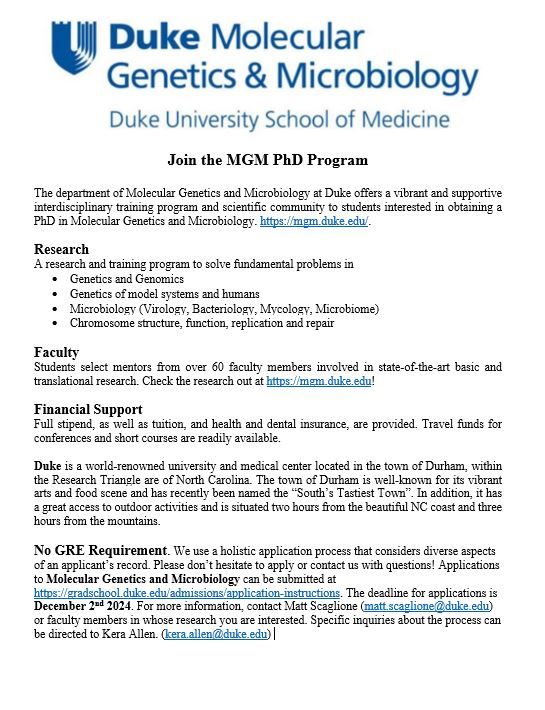**Update: The GRE is no longer required for MGM’s Ph.D. program**
Application fee waivers are available in a limited number of circumstances and are examined on a case-by-case basis. The application fee waiver process can be found at this link: https://gradschool.duke.edu/admissions/application-instructions/application-fee/
The Admissions Committee evaluates candidates based on academic performance, laboratory research experience, letters of recommendation, and a personal statement. The GRE is not required, and although students can elect to submit GRE scores, we take a holistic approach when reviewing applicants, including attention to evidence of curiosity, creativity, persistence, motivation, resilience, and problem-solving abilities. Top candidates are invited to interview in February and are encouraged to take advantage of the visit to meet student members of the Program and faculty. Following the interview, the Committee makes recommendations to the Dean of the Graduate School.
Students are admitted through Duke’s Graduate School to pursue a Ph.D. in Molecular Genetics and Microbiology by completing an online application with the Duke University Graduate School, which is then forwarded to and assessed by the MGM Admissions Committee. Additional information is also available on the Graduate School web site.
Students can also join the program following admission by one of the interdepartmental training programs (e.g., The Cell and Molecular Biology Program, the Developmental and Stem Cell Biology Training Program, and the Medical Scientist Training Program). These students join the departmental program with the approval of the Director of Graduate Studies (DGS).
Less frequently, students may transfer from another department into the program with the approval of the Admissions Committee.
Matriculation is only allowed in the fall semester.
Financial Assistance
The contributions of graduate students are highly valued in the Department of Molecular Genetics and Microbiology, and Duke has a strong commitment to financially support the students it selects for graduate study. The Department and the Duke University Graduate School offer a wide array of financial support. Funding is available from annually allocated awards funds, instruction, endowed fellowships, foundations and other private support, as well as federal research and training grants.
For additional information, please visit the Funding Opportunities section of this web site.
Commitment to Diversity
The Duke Molecular Genetics and Microbiology Graduate Program along with The Graduate School is dedicated to and benefits from a student population diverse in background, culture, socioeconomic status, race, ethnicity, and work and life experiences that contribute to a fuller representation of perspectives within the academic life of the university. In addition, within the Biomedical Graduate Programs in the School of Medicine and School of Nursing, we have an Office of Biomedical Graduate Education (OBGE) that provides signature programming for students within our program.
The Duke Molecular Genetics and Microbiology Graduate Program is committed to providing reasonable accommodations for qualified individuals with disabilities in compliance with Section 504 of the Federal Rehabilitation Act of 1973, the Americans with Disabilities Act (ADA) of 1990 and the ADA Amendments Act of 2008, as well as applicable state regulations and federal and state privacy laws.
If you believe you may need and qualify for reasonable accommodations, please visit Duke’s Disability Management System (DMS) for detailed information and procedures. The knowledgeable staff at DMS serves Duke’s undergraduate, graduate and professional students, trainees, employees, and faculty, as well as the public, in support of Duke University and Duke University Health System efforts to ensure an accessible, hospitable working and learning environment for people with disabilities. Through DMS, Duke ensures consistent processes for requesting accommodations, evaluating needs, and determining appropriate response, and the DMS serves as a clearinghouse for disability-related information, procedures and services available at Duke, in Durham, and in North Carolina. For detailed information about DMS visit: www.access.duke.edu.
